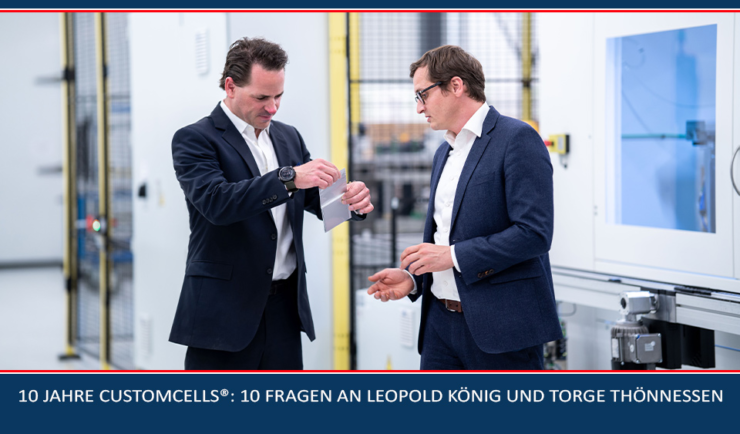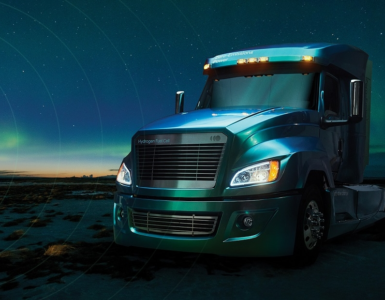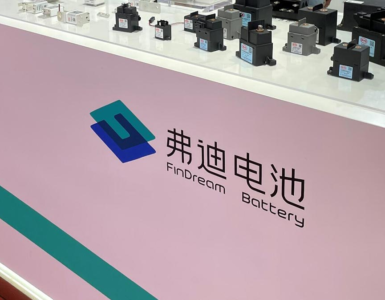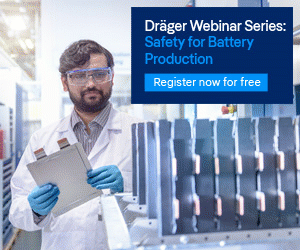10 years of CUSTOMCELLS: 10 questions for Leopold König and Torge Thönnessen. Im Jahr der CUSTOMCELLS-Gründung wurden exakt 2.956 Elektroautos neu zugelassen.
In diversen Beiträgen wurde damals das Scheitern der Energiewende auf der Straße beklagt. Sechs Jahre später erntete die CSU-Politikerin Dorothee Bär noch Hohn und Spott für ihren Verweis auf Flugtaxis. Was hat sie damals dennoch zuversichtlich gestimmt, dass CUSTOMCELLS erfolgreich sein kann?
Die Zuversicht hat sich daraus gespeist, dass auch Debatten, wie jene um die Aussagen von Dorothee Bär, nicht über die Herausforderungen hinwegtäuschen konnten, vor denen wir standen und aufgrund der technischen Entwicklungen auch heute noch permanent stehen.
Gleichzeitig haben wir durch das Scheitern anderer Start-Ups gelernt, dass für einen Erfolg insbesondere das Timing und der Umgang mit Ressourcen entscheidend sind. Das hat uns schnell auf einen schlanken Pfad geführt und zu einem Stufenplan, bei dem wir uns konsequent auf nicht-besetzte Bereiche im Markt konzentriert haben. Damit waren wir erfolgreich – und das hat uns angespornt, weiterzumachen.
🔥 What about we co-host a webinar? Let's educate, captivate, and convert the battery economy!
Batteries News is the global go-to online magazine for the battery industry, we can help you host impactful webinars that become a global reference on your topic and are an evergreen source of leads. Click here to request more details
Wann war Ihnen in den vergangenen zehn Jahren klar, dass CUSTOMCELLS sich tatsächlich am Markt etablieren kann?
Wir waren eine lange Zeit deutlich zu klein, um den Sprung in das Seriengeschäft der Automobilisten zu schaffen. Wir wussten aber, dass das „Startgeschäft“ sich stark transformieren müsste, um auf Dauer Bestand zu haben. So haben wir den Sprung mit Unterstützung des IPCEI vor etwa drei Jahren in die Großserie gewagt und eine logische vertikale Wertschöpfungskette aufgebaut.
War der Weg zurück in die Forschung für einen von Ihnen beiden jemals eine Option?
Haben wir die Forschung denn jemals ganz verlassen? Wir sind beide technikbegeisterte Unternehmer – genau wie eine Vielzahl unserer Mitarbeitenden bei CUSTOMCELLS. Das schließt Forschung mit ein. Durch das Unternehmertum haben wir die Möglichkeit, Forschung heute ganz direkt in die Praxis zu überführen und so durch innovative Technologien Mehrwerte für die Gesellschaft zu schaffen.
Es vergeht inzwischen kaum eine Woche, in der die Medien nicht über Alternativen zur Lithium-Ionen-Technologie berichten. Warum erachten Sie die Lithium-Ionen-Technologie auch für die kommenden 10 Jahre als dominierend?
It has now been a good three decades since lithium-ion technology was ready for the market. In our opinion, however, it has not yet reached the limits of its potential. Artificial intelligence or nanotechnology open up completely new possibilities for us to further develop lithium-ion battery cells.
At the same time, despite the occasional reports of success in the media, it is not an easy undertaking to transfer new types of accumulator or cell systems from the laboratory to practice. Being able to produce something on an industrial scale is very different from achieving successful results in the laboratory.
In job interviews, the question is often asked: Where do you see yourself in 10 years? We ask this question with CUSTOMCELLS in mind. Where do you see the company in 10 years?
We expect that CUSTOMCELLS will establish itself as an international group in the segment of premium battery cell production.
Here, too, business will expand along the vertical value chain, and we expect that in the future not only cells will be produced, but sensible electrification concepts that also contain software. In 10 years we will still be a company that will play a key role in the progressive electrification of mobility.
Will application-specific cells remain an issue – or will standardized cells ultimately prevail? What is the assessment of CUSTOMCELLS and what is the strategy?
The question is rather whether there will still be standardized cells in the future – in the sense of the large all-in-one solution. The offer on the market is increasingly differentiated. There are more and more applications that require lithium-ion batteries with very specific performance characteristics.
“Ahead in Innovation” is a living credo at CUSTOMCELLS. And we will remain true to that in the future. In 2016 we manufactured the first silicon cells. Started developing high-temperature cells in 2018.
These are both topics that are in demand today more than ever before. For the aviation sector, we have developed cells that set new standards in terms of both high energy and high power density.
A change is taking place in many industrial sectors. Products become services. To what extent are companies like CUSTOMCELLS working on such approaches in order to further extend the value chain?
In the early days, we geared our business model towards services. Today we cover large parts of the value chain of battery cell development and production with our service portfolio. The use of digital technologies enables us to further extend this value chain.
The basis for this is the connection of the battery to a cloud. Using the data obtained in this way, which provides us with information about the condition of the cells, for example, we will be able to provide our customers with additional services in the future and provide them with meaningful support even after the cells have been installed.
CUSTOMCELLS describes itself as a company “powered by people”. But how does a company like CUSTOMCELLS look for the right staff, especially in the early years, when there may not yet be any large HR departments?
The answer is already in the question. In the early years, we ourselves were the front and back office, the development and sales departments in one. Above all, we have tried to get people into our team who not only bring a lot of technological expertise, but also a doer mentality and the desire to help shape a future technology.
A good team is comparable to the world’s best battery cells. Outstanding performance can only be achieved if the chemistry is right and the interaction as a whole. And that’s exactly what we’ve been doing at CUSTOMCELLS for 10 years – and we’re doing it every day.
10 years of CUSTOMCELLS – that’s a long time. Which phase in the company’s history do you still remember particularly often today?
Of course, the same applies as for every founding team: there were ups and downs. But the early days in particular had a strong impact on us. Shortly after the company was founded, our only customer up to that point went bankrupt. We had to change our business model – and as quickly as possible. In retrospect, that shaped us in many ways.
The case made it very clear to us that history rarely runs in a straight line – and that we have to be fast, flexible and highly innovative with our products, services and ultimately the entire business model if we want to survive in the market. Today we can say: We succeeded. CUSTOMCELLS is at home in its customers’ markets.
We know the specific challenges in their industries and the requirements they place on our solutions. Our employees combine technical know-how with extensive experience from over 1,400 industrial projects. And that makes us successful.
Should have, should have … we know what happens next. But what is the one decision in the history of CUSTOMCELLS that, looking back, you would say was really groundbreaking?
There isn’t one decision. Every decision we made was important in hindsight in its own way. The joint venture with Porsche AG in recent years certainly has to be mentioned. And finally, of course, the appointment of Dirk Abendroth as CEO of the CUSTOMCELLS Group.
Building CUSTOMCELLS into a global leader with a key role in the premium battery market is exactly the challenge that now drives us together.
READ the latest Batteries News shaping the battery market
10 JAHRE CUSTOMCELLS: 10 FRAGEN AN LEOPOLD KÖNIG UND TORGE THÖNNESSEN, November 21, 2022








